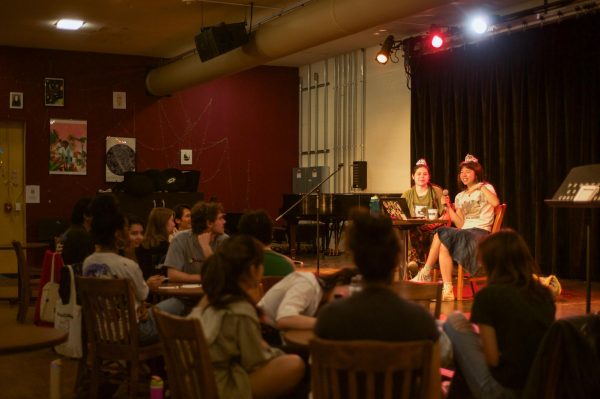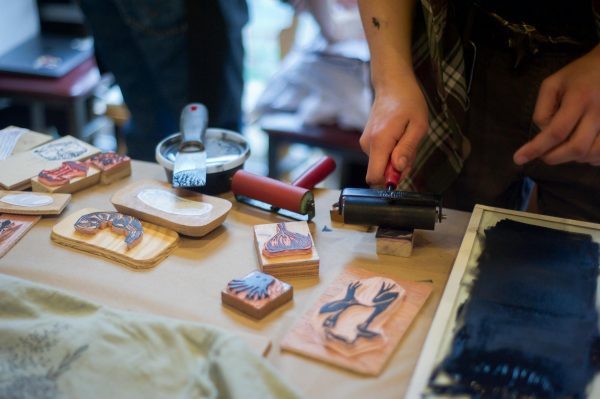Is Hotel Life All We Ever Imagined?
Any kid growing up in the early 2000’s knew the dream. We saw movies like Eloise at The Plaza, in which a six-year-old lives a lavish life, ordering room service every day at The Plaza Hotel in New York City; we saw it in TV shows like The Suite Life of Zack & Cody, in which two twins live in the Tipton Hotel and create chaos, tormenting leading Mr. Moseby, the hotel manager. Due to complications during the housing assignment process this year, this dream was realized for a handful of Obies when they were assigned to “dorm living” on the top floor of The Hotel at Oberlin.
The College has assigned some students to “transitional housing” for the semester after uncertainty caused by COVID-19 made it difficult to assign all students to dorm rooms.
College first-year Emma Sullivan found out she had been moved to the hotel just days before arriving on campus for the first time. As a first-year, she was initially concerned about the non-traditional college experience.
“I will say it was really tough the first few days, because it was hard to make friends,” Sullivan said. “It’s not a very social environment, … so that was tough at first, but now I’ve gotten adjusted. I’ve met some really cool people. So I like it now. Plus, it’s nice at the end of the day — like I’ve heard so many horror stories about the dorms — it’s nice just being able to unwind and not having to socialize with people.”
College third-year Olivia Bross was surprised when she was offered the position of Resident Assistant of the Hotel.
“I was worried there was a possible catch with it,” Bross said. “Because it is transitional housing, eventually the goal is to hopefully place [students] in actual dorms. [But] I was told that I would at least be here for the entire fall semester. People may be coming and going, but right now it’s been pretty stable with the people that we’ve had here. I like to joke around; I’m like, ‘Yeah, I’m the RA of the hotel; I’m practically Mr. Moseby.’”
While some students have been assigned to live in converted lounges, others get their own private bathroom and king-size bed at the hotel.
“Because I’m the RA they gave me a suite setup, so I have a pretty nice bathroom and I have a couch and living room setup,” Bross said. “This feels more like a small apartment for me. I don’t have a kitchenette or anything like that, but it feels like probably just a nicer Firelands type of setup.”
For Bross, finding out she was offered the RA of the hotel position was surprising.
“I was worried there was a possible catch with it,” Bross said. “Because it is transitional housing, eventually the goal is to hopefully place [students] in actual dorms. [But] I was told that I would at least be here for the entire fall semester. People may be coming and going, but right now it’s been pretty stable with the people that we’ve had here. I like to joke around; I’m like, ‘Yeah, I’m the RA of the hotel; I’m practically Mr. Moseby.’”
College first-year Emma Sullivan found out she had been moved to the hotel just days before arriving on campus for the first time. As a first-year, she was initially concerned about the non-traditional college experience.
“I will say it was really tough the first few days, because it was hard to make friends,” Sullivan said. “It’s not a very social environment, … so that was tough at first, but now I’ve gotten adjusted. I’ve met some really cool people. So I like it now. Plus, it’s nice at the end of the day — like I’ve heard so many horror stories about the dorms — it’s nice just being able to unwind and not having to socialize with people.”
Bross felt, however, that her capacity to build community as the RA was a challenge, but not more so than it has been for many RAs this year.
“I think we’re trying to make it as normal as possible, especially since we have an entire hall to ourselves that we only have access to,” Bross said. “It’s been more difficult for most RAs who are working in traditional housing. In East [Hall], they’re changing a lot of the lounges into dorm rooms, so there’s only one main lounge there. So it’s been an issue everywhere, but especially with the hotel. … It is weird because it’s so much quieter. Usually being in a dorm, most of your community-making is just saying ‘Hi’ to people as you’re walking in the halls and when you’re in the bathroom, and we don’t have that.”
Still, Bross is hoping to plan some special programs for her residents, like trick-or-treating down their hall or making use of the hotel’s restaurant.
Unlike Eloise, who calls the front desk to order one roast-beef bone, one raisin, and seven spoons — and charge it, please! — every morning, the students living in the hotel are not lavished with complimentary room service.
“They kind of are trying to treat you like a normal student and not a hotel guest,” College third-year Salma McLaughlin said. “The first night I came, I didn’t bring my pillows. So I asked for one [at the front desk] and he was like, ‘I can’t give you one, sorry. I have to treat you like any other student.’ But I mean, I also have my own bathroom and a king-size bed and [air conditioning]. So whether it’s like any other student, I’m not quite sure.”
However, the hotel students do get one special perk.
“Every Wednesday at 11 a.m., we can put out our dirty sheets and they’ll drop off clean ones for us,” Bross said.
In The Suite Life, the twins navigate a cast of characters, from the hotel’s candy counter girl, Maddie, to the hotel’s heiress, London, to Mr. Moseby. The fictional Tipton Hotel becomes a kind of haphazard and dysfunctional community. While Sullivan has never seen anyone swinging from a chandelier or any preteens chasing pet rats around The Hotel at Oberlin, she does say that the hotel has its charms.
“I think the hotel people are really nice,” Sullivan said. “So it does feel like there was a little bit of a sense of community. It’s not as sterile as some hotels, like they know my name and whenever I have a package they’re like, ‘Oh, you have a package!’ So that is really nice.”
A downside of living in the hotel is not being able to decorate. Unlike Eloise’s iconic, perfectly pink room, the students in Oberlin’s Hotel have very limited options when it comes to making the space their own.
“Luckily, the decor … in the hotel [is] very nice, but you aren’t allowed to hang up string lights, and you aren’t allowed to put up posters,” Bross said. “There’s different ways of decorating your space even if you can’t put up posters, but it was a real downside, especially for underclassmen. [For] the first-years I’m sure it’s very bizarre, because you have no idea what you’re getting into with college, and people prepare you to decorate your dorm, and then you walk in, and they’re like, ‘Nope, can’t do it.’”
Additionally, according to McLaughlin, the hotel dorms get a room check every other week — much more often than a normal dorm — to make sure the rooms are in good condition.
McLaughlin says that she has mostly adjusted to the hotel, though sometimes she reflects on the absurdity of the experience.
“It’s definitely weird coming back late at night and walking in the hotel,” McLaughlin said. “But it’s kinda nice. It feels fancy. Oh, and I do have a class [there] — my 9 a.m. class that meets right in StudiOC, so I waltz over there in my pajamas every day.”








